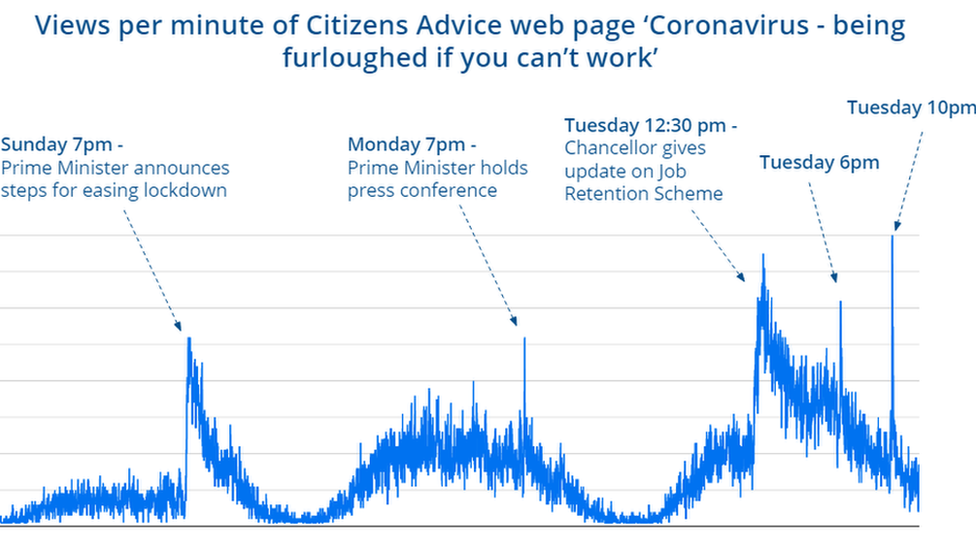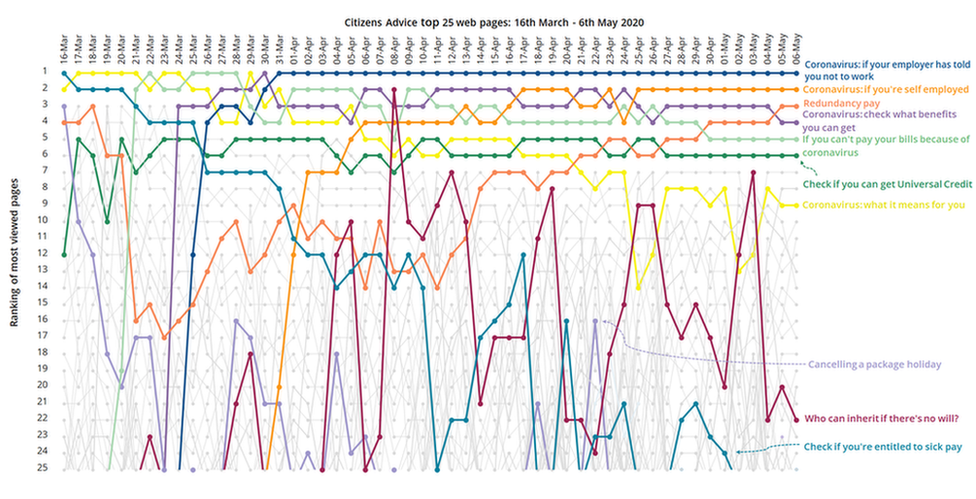Citizens Advice reports surge in demand for coronavirus help
- Published

Citizens Advice had the highest daily number of visitors to its website topped four times in one week
Citizens Advice opened for business the day after the outbreak of World War Two to provide guidance to the masses in the "toughest of times".
More than 80 years on, the charity has seen record-breaking demand for help in what has been described as Britain's - and the world's - greatest challenge since.
In the period between 16 March and 6 May, its website amassed a total of 13 million page views, an increase of 29% on last year, as many people searched for answers during the coronavirus crisis.
Dame Gillian Guy, chief executive of Citizens Advice, told the BBC the data "paints a picture of the worries of the nation".
The charity has also witnessed online traffic decrease during key press conferences and broadcasts by the prime minister and chancellor before page views "surge" again afterwards.

Citizens Advice said it had also seen a spike in website hits after the evening and late TV news bulletins
The most popular advice pages visited have included those featuring guidance on benefits, sick pay, furlough and workers' rights, as well as how to claim refunds over cancelled holidays.
Universal credit has been the most searched term on the charity's website during the lockdown, but the phrase was also the most common last year.
Its housing problems page, which includes advice on complaining about neighbours and disagreements over walls or fences, amassed 73,000 page views - an increase of 57% on the same period in 2019.
Pages advising on benefits hit 2.8 million views, including almost one million for those featuring guidance on universal credit.
Meanwhile pages on employment advice, for example about sick pay or furloughing, were viewed 2.3 million times - a 77% increase on last year.

Citizens Advice said they saw a spike in website visits following government broadcasts
In addition to the use of the charity's website, 279,000 people have received one-to one help from advisers and volunteers.
Ruth Stravis, an advice line volunteer in west Oxfordshire, said the team had been getting lots of calls about employment issues and "problems managing financially, with many requests for referrals to food banks".
"People are calling for advice on redundancies and lay-offs, and we're getting calls from self-employed people who have no income at the moment," she said.
Ms Stravis said the charity had also seen an increase in the number of younger people calling, with clients in their 20s increasing by 50% since before the pandemic.
"I'm glad I can be doing something directly useful at this incredibly difficult time. I think the situation is going to exacerbate a lot of inequality and expose a lot of need," she said.

Top five issues people received one-to-one help via telephone, email and web chat on:
Benefits & Tax Credits - 124,000
Universal Credit - 98,000
Debt - 83,000
Employment - 63,000
Housing - 51,000
Statistics provided by Citizens Advice for the period 16 March to 6 May

Desislava, a hairdresser who lost her job in March and was then evicted by her landlord, said the Citizens Advice service in Richmond, south west London, "literally saved me".
The charity helped her apply for a £500 grant for her to rent another property until she received universal credit.
"I had nowhere to go and very little money, I would have ended up living on the streets," the 33-year-old said.
Throughout the lockdown period, Citizens Advice tracked its top 25 web advice pages to show which provided a "real time snapshot" of the issues people needed guidance on.

Citizens Advice monitored the changes in daily rankings of its most viewed website advice pages
As Covid-19 infections spread faster and lockdowns began across Europe, advice pages on claiming refunds for cancelled holidays were most popular, before searches on sick pay surged, but the organisation's data showed those had gradually decreased since.
When the government advised the population to stay at home, pages offering guidance relating to redundancy and universal credit became the most visited and they were soon followed in popularity by searches for benefits advice.
Demand for information on being furloughed increased days later when the government launched the job retention scheme and many businesses ceased trading.
At the peak of the virus, believed to be on 8 April, a page advising on "Who can inherit if there's no will?" became the second most-visited page.
Allow X content?
This article contains content provided by X. We ask for your permission before anything is loaded, as they may be using cookies and other technologies. You may want to read X’s cookie policy, external and privacy policy, external before accepting. To view this content choose ‘accept and continue’.
David, a construction manager in London, said he used the website to answer questions about what the lockdown "meant for myself and my workers and if we could be furloughed".
He said the "accurate information" helped ease his and his teams' concerns over their incomes.
Since 21 April, the organisation's top six most-viewed pages, all to do with employment and benefits, had stayed constant, it said, albeit with a recent increase in views on advice for redundancy pay.
Dame Gillian said the charity would continue to see the effects of the virus and the reaction to it being felt across society "in the weeks and months to come".
She said: "More now than ever, we must listen to what these individual stories combine to tell us. At Citizens Advice we'll continue to give a voice to those we help to make sure people aren't being left behind."

RISK AT WORK: How exposed is your job?
SCHOOLS: When will children be returning?
EXERCISE: What are the guidelines on getting out?
THE R NUMBER: What it means and why it matters
LOOK-UP TOOL: How many cases in your area?

- Published3 April 2020
